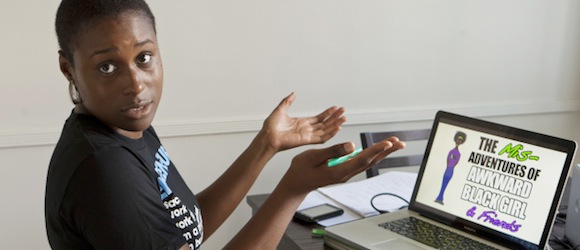Issa Rae On The Challenges of Making Insecure
"How hard is it to portray a three-dimensional woman of color on television or in film?"

“Where is Issa Rae’s HBO show?” I’ve been asking since I heard HBO approved the actress’ show, Insecure, back in 2013. In an interview from New York Times, Rae discusses an unwillingness to compromise on her artistic vision and I love her for it.
Rae gained a great deal of internet fame from her web-series, The Misadventures of Awkward Black Girl, a hilarious show I happened upon a few years back. Rae also came out with a memoir of the same name (which is a great read). While the interview points to shows like Black-ish and Empire as examples of successful shows with complex characters of color, Issae Rae describes the industry’s hesitance to make authentic and relatable protagonists of color. Despite many examples displaying a clear audience for these stories, Rae’s efforts to make her show are constantly frustrated.
Lots of networks and production companies were interested in Rae’s work after the success of her web-series, but wanted to strip it of everything that made it so great in the first place. Rae recalls an executive who wanted to change it to “a pan-racial franchise,” and another who wanted to recast “a lighter-skinned actress with long straight hair” as the lead. She turned down these offers:
They wanted to make it as broad as possible, broadly niche, but I was like: No, that’s not what this is about.
Rae then worked on the screenwriting for Insecure with actor and writer Larry Wilmore, who worked on shows like The Fresh Prince of Bel-Air, The Bernie Mac Show, The PJs, and Sister, Sister. However, she was met with more obstacles that wouldn’t allow her to follow the story she wanted to tell. Although Rae brought up names of writers to work as writers on the show, HBO had “little interest” in hiring them, citing experience as the reason. She also discusses the important of diversity both behind and in front of the camera.
It still feels like we need to be in charge to prioritize story lines. Behind the scenes, it can be very white.
It’s hard not to compare Insecure with HBO’s Girls, a show that’s already four seasons in. Indiewire points out that many have called the show “resonant,” and similar to Insecure, it’s a personal story where the lead is tied to the writer. Also, despite many observations and criticisms about the lack of diversity on the show, Girls is doing pretty well for itself. So if people of color are expected to find white stories universal and relatable, why doesn’t it work the other way around?
On 2009’s hit film Precious, Rae expressed her discomfort with the film:
… not because I disliked the film, not because I couldn’t relate to the story, but because Hollywood was so [expletive] excited about this movie. Is that what it takes to create a sympathetic black female lead character?
Rae, who calls herself “awkward” points out that you often see “sassy” or other stock black characters, but rarely “awkward.” She adds:
How hard is it to portray a three-dimensional woman of color on television or in film? I’m surrounded by them. They’re my friends. I talk to them every day. How come Hollywood won’t acknowledge us? Are we a joke to them?
I would recommend reading the full interview, where Rae discusses her experiences growing up as a minority and her effects to elevate other people of color in the industry.
—Please make note of The Mary Sue’s general comment policy.—
Do you follow The Mary Sue on Twitter, Facebook, Tumblr, Pinterest, & Google +?
Have a tip we should know? [email protected]